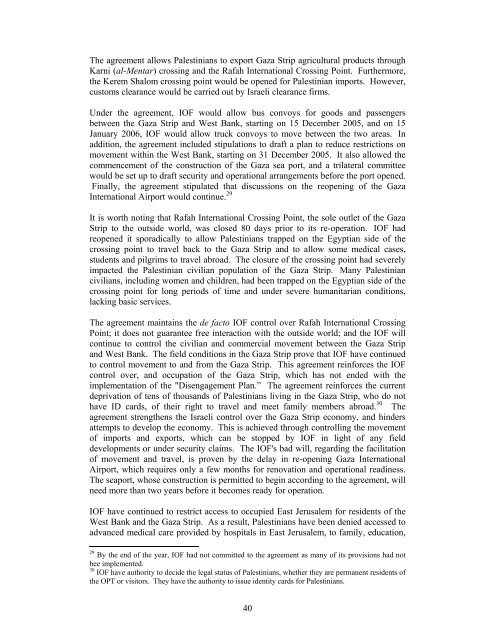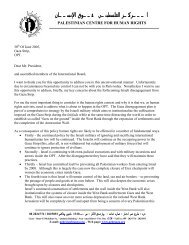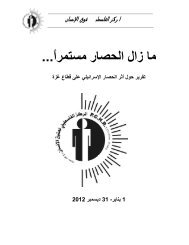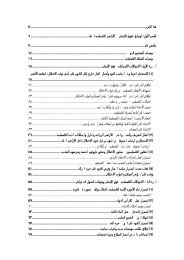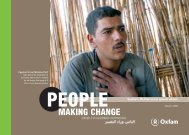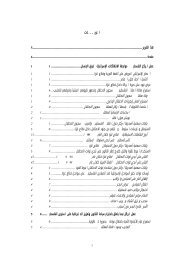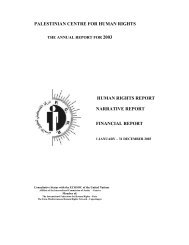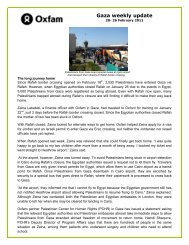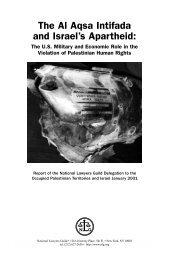Annual Report - Palestinian Center for Human Rights
Annual Report - Palestinian Center for Human Rights
Annual Report - Palestinian Center for Human Rights
Create successful ePaper yourself
Turn your PDF publications into a flip-book with our unique Google optimized e-Paper software.
The agreement allows <strong>Palestinian</strong>s to export Gaza Strip agricultural products through<br />
Karni (al-Mentar) crossing and the Rafah International Crossing Point. Furthermore,<br />
the Kerem Shalom crossing point would be opened <strong>for</strong> <strong>Palestinian</strong> imports. However,<br />
customs clearance would be carried out by Israeli clearance firms.<br />
Under the agreement, IOF would allow bus convoys <strong>for</strong> goods and passengers<br />
between the Gaza Strip and West Bank, starting on 15 December 2005, and on 15<br />
January 2006, IOF would allow truck convoys to move between the two areas. In<br />
addition, the agreement included stipulations to draft a plan to reduce restrictions on<br />
movement within the West Bank, starting on 31 December 2005. It also allowed the<br />
commencement of the construction of the Gaza sea port, and a trilateral committee<br />
would be set up to draft security and operational arrangements be<strong>for</strong>e the port opened.<br />
Finally, the agreement stipulated that discussions on the reopening of the Gaza<br />
International Airport would continue. 29<br />
It is worth noting that Rafah International Crossing Point, the sole outlet of the Gaza<br />
Strip to the outside world, was closed 80 days prior to its re-operation. IOF had<br />
reopened it sporadically to allow <strong>Palestinian</strong>s trapped on the Egyptian side of the<br />
crossing point to travel back to the Gaza Strip and to allow some medical cases,<br />
students and pilgrims to travel abroad. The closure of the crossing point had severely<br />
impacted the <strong>Palestinian</strong> civilian population of the Gaza Strip. Many <strong>Palestinian</strong><br />
civilians, including women and children, had been trapped on the Egyptian side of the<br />
crossing point <strong>for</strong> long periods of time and under severe humanitarian conditions,<br />
lacking basic services.<br />
The agreement maintains the de facto IOF control over Rafah International Crossing<br />
Point; it does not guarantee free interaction with the outside world; and the IOF will<br />
continue to control the civilian and commercial movement between the Gaza Strip<br />
and West Bank. The field conditions in the Gaza Strip prove that IOF have continued<br />
to control movement to and from the Gaza Strip. This agreement rein<strong>for</strong>ces the IOF<br />
control over, and occupation of the Gaza Strip, which has not ended with the<br />
implementation of the "Disengagement Plan.” The agreement rein<strong>for</strong>ces the current<br />
deprivation of tens of thousands of <strong>Palestinian</strong>s living in the Gaza Strip, who do not<br />
have ID cards, of their right to travel and meet family members abroad. 30 The<br />
agreement strengthens the Israeli control over the Gaza Strip economy, and hinders<br />
attempts to develop the economy. This is achieved through controlling the movement<br />
of imports and exports, which can be stopped by IOF in light of any field<br />
developments or under security claims. The IOF's bad will, regarding the facilitation<br />
of movement and travel, is proven by the delay in re-opening Gaza International<br />
Airport, which requires only a few months <strong>for</strong> renovation and operational readiness.<br />
The seaport, whose construction is permitted to begin according to the agreement, will<br />
need more than two years be<strong>for</strong>e it becomes ready <strong>for</strong> operation.<br />
IOF have continued to restrict access to occupied East Jerusalem <strong>for</strong> residents of the<br />
West Bank and the Gaza Strip. As a result, <strong>Palestinian</strong>s have been denied accessed to<br />
advanced medical care provided by hospitals in East Jerusalem, to family, education,<br />
29<br />
By the end of the year, IOF had not committed to the agreement as many of its provisions had not<br />
bee implemented.<br />
30<br />
IOF have authority to decide the legal status of <strong>Palestinian</strong>s, whether they are permanent residents of<br />
the OPT or visitors. They have the authority to issue identity cards <strong>for</strong> <strong>Palestinian</strong>s.<br />
40


